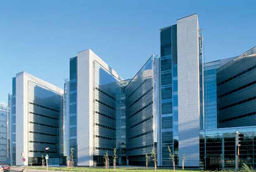Overview of IP video surveillance and Network video Recorders (NVRs)
7
APRIL, 2017
Analog IP camera is essentially a camera that you plug into a wire that goes back to the DVR (Digital Video Recorder), and then the camera constantly sends video back to that DVR. With analog cameras you’re dealing with an old VCR or a Video Cassette Recorder.
IP video surveillance cameras on the other hand are full-fledged computers that process video. IP cameras are actual computers onto themselves. They have a camera on them, they normally have a web server built in. The difference between IP cameras and analog cameras is how they transmit the video and how much intelligence each one has. There is a whole bunch of stuff that you can do with IP video cameras that you simply cannot do with analog cameras.
Overview of IP video cameras

The DVR is the only thing in the system that has any real intelligence, any real programming in analog cameras. In the DVR you can set when you want the cameras to record, if you want the cameras to record and if you want alerts to trigger. Any kind of intelligence resides in the DVR itself not in the cameras. The cameras basically give a continuously stream video back to the DVR regardless of what happens and then the DVR figures out what to do with the video.
IP Video cameras are different IP cameras. IP video cameras are computers on themselves. The camera itself has intelligence. When you plug the IP camera into your local area network, it will be able to get an IP address or you can assign it a static IP address.
You can set a lot of configurations in the IP video cameras themselves without the need for the DVR. You can set within the camera how recording will happen, you can tell the camera whether or not it will record all the time or will record only when there is a motion. Also, these cameras have internal storage and you can configure the camera to write the video to the internal storage of the camera itself, or configure it to write the video to a local storage unite or move the video recordings to the cloud. With an IP camera you can change the default gateways and you can change the resolution at what the camera will record at. Almost any configuration you would find in a DVR you will find in each individual IP camera.
Analog vs. IP cameras
When you’re dealing with IP video cameras you will hear of something called NVRs or network video recorders. So with analog cameras the main video servers are called a DVR, in the IP world the main server is called an NVR.
That network video recorder is able to go out and communicate with all of the cameras that are on the network. So just like you would sit down at a Windows Active Directory server and be able to change configurations for the entire network at that one server, that is what you can do at most NVRs.
NVRs to simplify management
Since every single camera on your network has its own configurations, it can take a long time to change those configurations for twenty or fifty or a hundred different IP cameras. However, with these network video recorders you can sit down and you can propagate out all the changes to all of those cameras at one place. That’s one reason why people use NVRs. That would be one thing that you have to think about when you’re using IP Video surveillance cameras – you don’t need that centralized server the way you do in the analog once. You can simply put up IP cameras that all point back to a video storage appliance, single FTP server or to the cloud using a DNF Cloud connection just for file storage and that’s it. And you don’t need any other kind of sophisticated server. If you’re doing a very sophisticated build out of your surveillance infrastructure you will want to use an NVR network video recording platform. That will be able to go out and communicate with all these different IP cameras on the network. The big thing to remember with IP video surveillance cameras is that they are computers unto themselves and that makes things a lot easier. IP Video surveillance cameras can be configured by simply going to the IP address of the camera in any standard web browser. Whether you use internet explorer, firefox, safari or google chrome. You simply have to know the IP address of the camera, you plug that IP address into the web browser and you get a login screen where you’ll be able to configure all the IP camera settings that you want to have.
Unify your security operations
DNF Security is a leading innovator in IP video surveillance systems and has helped transform the industry by providing customers with a unified-portfolio of IP video surveillance, video storage appliances & server and Network attached Storage (NAS) solutions. Designed to leverage the benefits of network technology, DNF Security products are built on an open-architecture, allowing customers to choose from a wide range of cutting-edge devices, and providing unsurpassed flexibility to allow the system to evolve and grow with the needs of customers. The core of our technology is unified IP video surveillance and video storage appliances, on-premise or in the cloud storage solutions for small, mid-sized and large enterprises.



